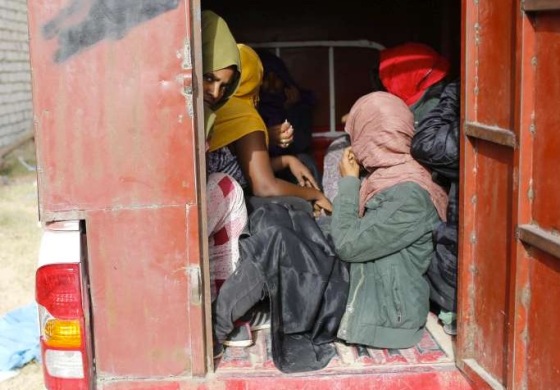UN Security Council to review Europe’s Libyan refugee detention plans
2017-02-08 12:50:53 Written by Martin Plaut Published in English Articles Read 2708 times
by Martin Plaut |

Today (Wednesday) the UN Security Council will be warned that European plans to hold refugees in Australian style off-shore detention centres could leave asylum seekers in real danger.
At their summit in Malta last Friday Europe's leaders issued a statement saying that they are “seeking to ensure adequate reception capacities and conditions in Libya for migrants, together with the UNHCR and IOM.”
But holding refugees in Libyan detention centres would leave them vulnerable to what the UN warned are "unimaginable" abuses including sexual violence and torture.
The European plan would mean working closely with the Libyan coastguards, who are accused of being complict in these abuses (see below).
The Security Council has been sent a statement by Zainab Bangura, the Special Representative of the Secretary-General on Sexual Violence in Conflict, warning about the situation faced by migrants face sexual violence in Libya's official and unofficial detention centres.
Libyan coastguards collaborate in "unimaginable" human rights abuses
Ms Bangura warned that the detention centres were places in which the Islamist group, ISIL inflicted “systematic sexual violence”on those who are held.
This reflects the findings of last December's UN report which citied “unimaginable” human rights violations and abuses of migrants in Libyan detention centres.
Below is a UN summary of the report, which can be read in full here.
The report, published jointly by UNSMIL and the UN Human Rights Office, is based on information gathered in Libya and from interviews with migrants who had arrived in Italy from Libya, among other sources.
Migrants are held in detention centres mostly run by the Department for Combatting Illegal Migration (DCIM), where there is “no formal registration, no legal process, and no access to lawyers or judicial authorities,” the report states.
Places of detention are severely overcrowded, with insufficient food and clean water. With no access to toilets, detainees are often forced to defecate and urinate in their cells. Malnutrition, acute diarrhoea, respiratory problems and infectious diseases, including scabies and chickenpox, are common.
Smugglers and traffickers also hold migrants in “connection houses”, on farms and in warehouses and apartments, where they are forced to work to earn money for their onward transport.
“We are called animals and are treated as animals,” a 16-year-old boy from Eritrea told UNSMIL. “They beat us with what falls into their hands…it can be a rock, a stick, a brick,” a child migrant interviewed in Italy said.
The report also notes that DCIM and the Libyan Coast Guard are subject to pressure from the armed groups that have proliferated since 2011. UNSMIL has received reports that some State employees and local officials have participated in the smuggling and trafficking process.
The report also details accounts of armed men, allegedly from the Libyan Coast Guard, intercepting migrant boats and abusing migrants. Migrants brought back to shore describe being beaten, robbed and taken to detention centres.
“Libya must acknowledge that migrants are being abused,” said Mr. Kobler. “But addressing migration is not only Libya’s responsibility. Countries of origin and destination beyond Libya also need to play their part.” He added: “I welcome the life-saving efforts currently being made by many in the Mediterranean.”
Among the report’s recommendations to Libya are: immediately release the most vulnerable migrants, with a view to urgently ending all arbitrary detentions; reduce the number of detention centres; ensure women are held separately from men; improve conditions of detention and protect detainees from torture and all other forms of abuse; and, in the medium-term, decriminalize irregular migration and adopt an asylum law.
The report also recommends that countries of destination beyond Libya continue search and rescue operations in the Mediterranean. Training and support for Libyan institutions that engage with migrants, including the Libyan Coast Guard, should be accompanied by comprehensive efforts to stop arbitrary detention of migrants and improve their treatment in detention.
“These are people who, for a range of reasons, feel compelled to leave their own countries and embark on these desperate and precarious journeys. The report lays bare the suffering endured by these migrants who have experienced unimaginable abuse and, in some cases, fallen victim to the despicable trade in human lives,” said High Commissioner Zeid.
“The report serves to deepen our compassion and strengthen our resolve that the rights of migrants should be fully protected and respected, whatever their status.”
